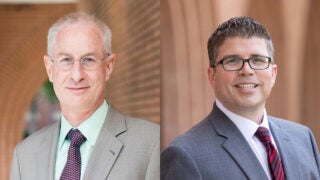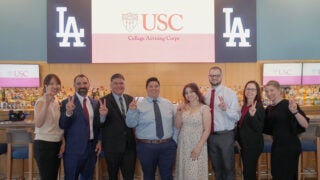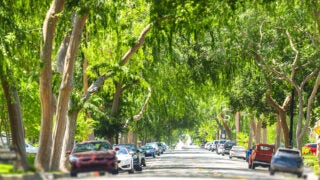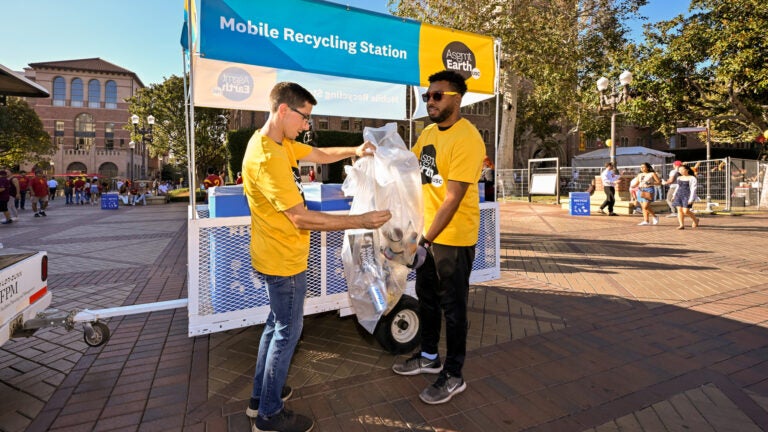
USC’s ‘Assignment: Earth’ initiative takes center stage during Earth Month
EARTH MONTH: The university is dedicating April to reducing pollution, inspiring innovation and driving engagement to help the planet.
Environmental research’s top prize returns home. Zero waste zones have debuted at campuses. And USC scientists are experimenting with novel approaches to reduce carbon emissions and making groundbreaking discoveries.
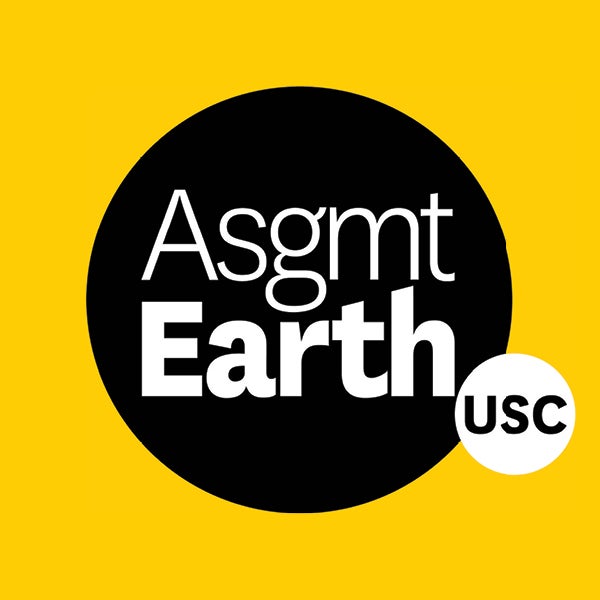 These are just some of the university’s numerous achievements in sustainability over the past year that are under the USC “Assignment: Earth” banner. For the first time, USC is designating April as Earth Month to further all efforts to reduce pollution, inspire innovation and drive engagement to help the planet.
These are just some of the university’s numerous achievements in sustainability over the past year that are under the USC “Assignment: Earth” banner. For the first time, USC is designating April as Earth Month to further all efforts to reduce pollution, inspire innovation and drive engagement to help the planet.
“Earth Month is a special opportunity to show our gratitude and affection for our beautiful, living, breathing home that’s the source of all life,” USC President Carol L. Folt said.
“At USC, we’re matching our appreciation with concrete action: Since announcing Assignment: Earth last April, we’ve moved an additional 25% of our electricity usage to renewable energy sources and kept more than 1.5 million single-use plastic bottles from entering the waste stream. Across our diverse 22 schools, we’re ensuring sustainability is a part of our curricula and our daily conversations. And soon, we’ll open a beautiful Sustainability Hub right at the center of UPC — it will be a place to convene, to learn and to share ideas. USC is really on the move here, and I can’t wait to see all the new things on the horizon,” she said.
(Story continues after video)
The university is one year into Assignment: Earth, the universitywide framework to achieve climate neutrality by 2025 and zero waste by 2028. The March release of the USC Office of Sustainability’s annual USC Sustainability Progress Report documented the improvements made since the university established baselines in 2014.
“USC is making meaningful sustainability progress across numerous categories — energy conservation, water efficiency, diverting waste from landfills and integrating sustainability into more classes, for example,” USC Chief Sustainability Officer Mick Dalrymple said. “This past year was about establishing a solid foundation to build on in order to achieve our ambitious Assignment: Earth goals. We know where we need to go — it’s ambitious, and we’re learning how to accelerate our pace to get there.”
Assignment: Operations
A year ago, the university launched Assignment: Earth and announced it would no longer purchase plastic single-use bottles. A year later, the results are stunning: Over 1.5 million single-use plastic beverage bottles were diverted from entering the waste stream. The Los Angeles Memorial Coliseum also set a new high-water mark in waste reduction, successfully diverting 91.7% of trash collected during the 2022 USC Trojan football season.
Dalrymple noted the accomplishments are impressive, but there are many more challenges ahead for the Trojan community to address together.
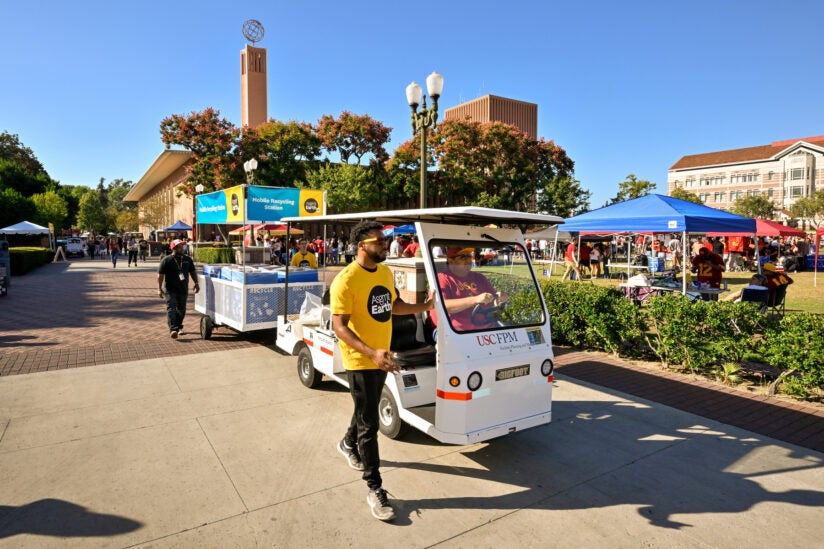
“Achieving zero waste at a university like USC is a complex equation,” Dalrymple said. “You need the proper infrastructure and the ability to manage what materials enter campus. The challenge increases dramatically because it involves influencing purchasing behaviors in a decentralized environment. Success will hinge on behavioral change. All Trojans have a part to play: We have to commit to rethinking waste as a resource — first reduce and reuse, and then recycle and compost.”
The university also reduced its greenhouse gas emissions dramatically thanks to a new agreement with the L.A. Department of Water and Power for renewable energy. With this agreement, 70% of the electricity that USC receives from LADWP is now carbon-free and campus energy efficiency has improved by more than 15%.
Greenhouse gas emissions controlled by the university (scope 1 and 2) dropped 31% since 2014.
“Even as USC continues to grow, its operations are becoming more efficient,” Dalrymple said. “Also, LADWP is providing cleaner electricity options. Continued progress on both these fronts is key for USC to achieve our 2025 climate neutrality goal.”
Assignment: Engagement
Visitors to USC’s campuses will immediately notice the central role sustainability plays in the daily life of the university. Hundreds of campus hydration stations at both University Park and Health Sciences campuses encourage the use of reusable and refillable containers. Clear signage for multi-stream waste bins aid in identifying where to dispose of your trash to assure it doesn’t end up in landfill unnecessarily.
Signage and events about new sustainable practices are all part of community engagement, a key tentpole in Assignment: Earth. The Office of Sustainability has found that increased engagement is positively correlated to improved sustainability literacy and increased self-reported behavior.
“Interest in learning about sustainability at USC is high,” Dalrymple said. “However, a lot of sustainability wins and challenges are not readily visible. You’ve got heavy lifting behind the scenes, for example, for energy efficiency and water conservation, about which it is challenging for people to get excited.
We receive many inquiries about recycling and composting from students, faculty and staff. Why? Everyone touches waste every day.
Mick Dalrymple, USC chief sustainability officer
“On the other hand, we receive many inquiries about recycling and composting from students, faculty and staff. Why? Everyone touches waste every day. Energy and water are much less tangible. Waste infrastructure, while still being deployed for consistency across campuses, is highly visible and brings attention to the issue, as well,” he said.
To better understand the sustainability IQ of the USC community, the Office of Sustainability recently launched its annual sustainability survey. The 2023 survey measures sustainability literacy, culture and behavior across the university and helps guide programming and planning. It is available online through April 16.
Signifying sustainability’s rising importance to the university, the USC Sustainability Hub is set to open in fall 2023 in the Gwynn Wilson Student Union building. Designed to facilitate collaborations across disciplines, the hub will host meetings, events, workshops, networking and the university’s first group of interdisciplinary postdoctoral fellows specifically focused on finding solutions to climate-related issues.
The university will also debut its first zero waste zone at the Little Galen dining hall during Earth Month. Each zone — more are planned to be installed throughout the year — will solely feature containers and packaging that are compostable or recyclable.
To commemorate Earth Month, the university and its 22 schools will hold dozens of events to educate and entertain, including:
- Mulyana: Modular Utopia art exhibit at the USC Fisher Museum of Art.
- The Vanishing Worlds of Audubon: Birding Walk and Creative Workshop put on by USC Visions and Voices.
- The annual Climate Forward conference by the Wrigley Institute for Environmental Studies and the Center for the Political Future at the USC Dornsife College of Letters, Arts and Sciences.
- The university’s annual celebration of Arbor Day on April 28, when Facilities Management Services and tree-lovers will plant new trees on campus.
- The Tyler Prize for Environmental Achievement award ceremony honoring the 2023 laureates, marine biologist Daniel Pauly and economist Rashid Sumaila.
- The Environmental Student Assembly presentation of featured speaker Leah Thomas.
The latter event is supported by the newly created Community Accessibility Restoration & Ecology, or CARE Grant, a program to highlight the intersection of sustainability and diversity, equity, inclusion and belonging. Developed by the USC Office of Inclusion and Diversity, the grant also will co-fund The Art and Climate Collective’s Annual Sustainability Fair and a Land Back Arts symposium.
Assignment: Research
Research geared toward identifying, analyzing and developing solutions for a world facing climate change and other environmental issues continues to flourish at USC. Since the beginning of 2023, USC researchers have published peer-reviewed studies or reports on:
- The adoption of electric vehicles being tied to reduced air pollution and improved health, from the Keck School of Medicine of USC.
- Plastic waste’s potential to be converted into valuable products, such as pharmaceuticals and agricultural products, from USC Dornsife and the USC Alfred E. Mann School of Pharmacy and Pharmaceutical Sciences.
- The impact of DDT in the Pacific Ocean waters near L.A., funded by the USC Sea Grant.
- The plight of the Nile River Delta, which may predict the fate of the Colorado River if it continues to be overused, signaled in research by the USC Viterbi School of Engineering.
These studies represent only a handful of the climate- and sustainability-related research projects underway across USC. The pace of discovery is set to increase, according to Ishwar K. Puri, senior vice president for research and innovation.
USC-led innovation can develop the human solutions necessary to make progress on these challenges, Puri said in a recent interview.
“Sustainability-related research taking place at USC continues to provide new insights and present potential paths toward a more equitable world,” Puri said. “USC experts have made important discoveries that address some of the most difficult challenges our world faces. Rapidly accumulating plastic waste, increasingly toxic air pollution in our cities and declining trust in science are just a sample of the problems our researchers are taking on.”

